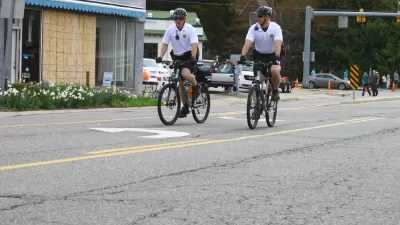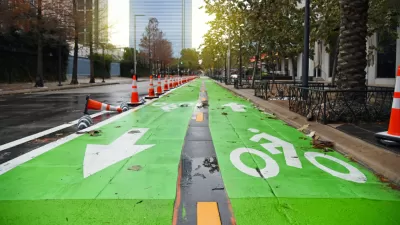Following the lead of New York City and San Francisco, Houston is the latest large American city to launch a program aimed at eliminating bike fatalities. The program includes funding for the creation of a Bicycle Master Plan.
A press release from the Office of Mayor Annise D. Parker announced the “Goal Zero” program for bicycle safety in Houston: “Mayor Annise Parker today announced the City and BikeHouston are joining forces to launch a major bike safety campaign to enforce and educate motorists and cyclists about the existing Safe Passing Ordinance, as well as create a Bicycle Master Plan for the City.”
The press release includes the following soundbite from Mayor Parker, who explains the motivations and initial policy directives behind Goal Zero: “Whether on a bike or behind the wheel, we have to abide by the rules of the road and learn how to share the road safely. Unfortunately, a spate of recent bicycle fatalities on Houston streets indicates there is much work to be done in this area. As a first step, I am dedicating $50,000 toward the cost of a Bicycle Master Plan that will guide our future decisions regarding placement of dedicated on-street bike lanes and infrastructure.”
At first, at least, the program will consist of greater enforcement of traffic laws for both drivers and bikers: “As part of the enforcement component of the campaign, the Houston Police Department has instructed officers to ticket drivers who violate the City’s new Safe Passing Ordinance and cyclists that disregard their responsibilities to obey traffic laws.”
FULL STORY: Mayor Annise Parker Announces Goal Zero Fatalities Bike Safety Campaign

Trump Administration Could Effectively End Housing Voucher Program
Federal officials are eyeing major cuts to the Section 8 program that helps millions of low-income households pay rent.

Planetizen Federal Action Tracker
A weekly monitor of how Trump’s orders and actions are impacting planners and planning in America.

Ken Jennings Launches Transit Web Series
The Jeopardy champ wants you to ride public transit.

Crime Continues to Drop on Philly, San Francisco Transit Systems
SEPTA and BART both saw significant declines in violent crime in the first quarter of 2025.

How South LA Green Spaces Power Community Health and Hope
Green spaces like South L.A. Wetlands Park are helping South Los Angeles residents promote healthy lifestyles, build community, and advocate for improvements that reflect local needs in historically underserved neighborhoods.

Sacramento Plans ‘Quick-Build’ Road Safety Projects
The city wants to accelerate small-scale safety improvements that use low-cost equipment to make an impact at dangerous intersections.
Urban Design for Planners 1: Software Tools
This six-course series explores essential urban design concepts using open source software and equips planners with the tools they need to participate fully in the urban design process.
Planning for Universal Design
Learn the tools for implementing Universal Design in planning regulations.
Heyer Gruel & Associates PA
Ada County Highway District
Institute for Housing and Urban Development Studies (IHS)
City of Grandview
Harvard GSD Executive Education
Toledo-Lucas County Plan Commissions
Salt Lake City
NYU Wagner Graduate School of Public Service




























